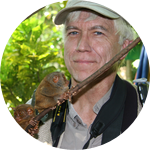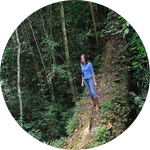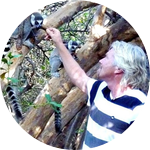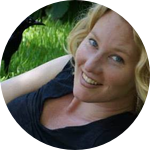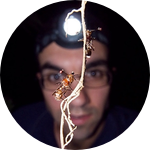About This Project
Lemurs are in Trouble. They are the world’s most endangered vertebrates, and attempts to reintroduce captive-raised lemurs to the wild may be necessary within a decade. We will investigate whether lemurs born and raised in zoos have essential skills needed to survive in the wild by extracting food from a novel ‘False Fruit’ and navigating a complex 3D maze we call the ‘Tangled Tree’. Boot camp is tough and there’s no cheating allowed - they will receive no help or training on the tasks!
Ask the Scientists
Join The DiscussionWhat is the context of this research?
The lemurs of Madagascar are disappearing fast, due to habitat loss caused by deforestation and climate change. Bristol Zoological Society is a global leader in lemur conservation, and we are committed to getting creative with our conservation efforts. Conserving animal numbers is important, but scientists now hope to conserve the cognitive skills and behaviors of animals to help them survive and thrive. We know that wild lemurs are adept at finding food in rich, spacious habitats, but don’t fully understand how flexible lemurs can be at exploiting new areas and foods. We will put our zoo lemurs through their paces with two tasks designed to resemble challenges they would face in the wild; in doing so we will assess whether captive lemurs have retained or lost evolved cognitive skills.
What is the significance of this project?
Reintroducing zoo lemurs into the wild is a realistic conservation option in future decades. This project is critical ex situ research, assessing whether zoo lemurs may have what it takes to survive in the wild. If their performance on our tasks is low, we can consider how to help lemurs acquire better survival skills. We can think about ways to make sure lemurs are equipped with the tools they need to face their rapidly changing landscape. If the ‘False Fruit’ is successful, it could be used to provide food for lemurs when they are first reintroduced, so that they are well-fed but still challenged. This project will also raise the public profile of lemurs by engaging visitors with cognitive research.
What are the goals of the project?
With your funding support, we will design, test, implement and evaluate two tasks at Bristol Zoological Society’s two zoos.
The first task is a ‘False Fruit’, requiring novel problem-solving skills to open and eat. We aim to build a tough nut to crack; something lemur-sized and totally different from normal enrichment. The second task, the ‘Tangled Tree’, is an expansive 3D lemur obstacle course.
Some captive animals have been ‘trained’ for reintroduction using mock predators and restricting food. Training means wild-type cognitive skills may not be challenged spontaneously, so we will let lemurs figure out the tasks for themselves without our help!
We intend to publish our results for conservationists, cognitive scientists and those with a general interest. Everyone is welcome.
Budget
UPDATE: Now we have created an additional $1000 'stretch goal' which means we are continuing to raise funds to make the False Fruit and Tangled Tree more sophisticated. We have thought about ways to make these tasks more ecologically relevant for the lemurs, and budgeted accordingly.
Oh course, the more money we raise the bigger and better this research project becomes!
We want our project to fit within the existing lemur enclosures and cause minimum disruption to the lemurs and their care staff. Safety testing will be necessary before anything enters the enclosures, so prototypes need to be included in the budget too. We have an on-site workshop and hope to make as much as possible here. However, we do have colleagues at nearby universities to provide design advice if needed.
Endorsed by
Meet the Team
Team Bio
Bristol Zoological Society is a conservation and education charity, which runs and operates Bristol Zoo Gardens and the Wild Place Project. Christoph, Fay and Sam work in the Field Conservation and Science department, which plays a strong role in worldwide lemur conservation through IUCN Red List Assessments and collaboration with Madagascan field workers. Alison is a Dartmouth College researcher with expertise in linking cognition and conservation.
Fay Clark
I am an academic interested in the behavior, cognition and well-being of wild animals housed in captivity (including traditional zoos, safari and wildlife parks, and aquariums). I work for Bristol Zoological Society, based at Bristol Zoo (UK) with collaborative links to other zoos worldwide. I specialize in the areas of cognitive enrichment, welfare assessment and statistics for zoo biology, and I have veterinary, zoological and anthropological training.
Sam Cotton
I am an evolutionary biologist and behavioral ecologist interested in conservation issues. Having worked at University College London and the University of Lausanne, Switzerland, I now work for Bristol Zoological Society, based at Bristol Zoo (UK). I investigate how animal behaviors change and evolve in response to variation in the environment.
Alison Greggor
I am a researcher at Dartmouth College, having recently completed my PhD as a Gates-Cambridge Scholar at the University of Cambridge. With a background in psychology, I am fascinated by how animals respond, learn and survive amid the changes humans have made to the environment. I've worked on species ranging from crows to hermit crabs, applying knowledge of learning and memory to better understand conservation-relevant behaviors.
Christoph Schwitzer
I am Director of Conservation at the Bristol Zoological Society. Prior to this I was BZS’ Head of Research for seven years. Before coming to Bristol, I worked as part of the primatological research group at Cologne Zoo, Germany, and spent two years in Madagascar building a field station and heading a lemur research and conservation programme for a French NGO. I gained my PhD in Zoology from the University of Cologne in 2003 and have been a Visiting Professor at the University of the West of England since 2013. I am the Vice Chair for Madagascar, and Red List Authority Coordinator, of the IUCN Primate Specialist Group. I am also Vice President of the Association Européenne pour l’Etude et la Conservation des Lémuriens, a consortium of European zoos dedicated to lemur conservation. My recent research has focused on how different Critically Endangered primates are coping with habitat degradation and fragmentation with regard to their behaviour patterns, food intake, population density, and parasite burden.
tim bray
I am a Conservation Geneticist specializing in using molecular genetic approaches to answer questions in conservation, ecology, and the distribution of biological diversity. I have worked with a variety of ecological and evolutionary systems across a wide range of spatial and temporal scales as well as considering genetic data in the context of environmental variables. Although my research has predominantly concentrated on mammalian populations in Africa and Arabia, I have also worked with invertebrates and am currently moving into amphibian conservation and research.
Additional Information
Please help us to reach $2000 by continuing to donate. We initially set out to raise $1000 and were able to do so... now we know we can do more with your support.
As our research progresses, we will use 'Lab Notes' to tell our backers what we’ve been doing, how we’ve been doing it, and why. We want everyone to feel welcome, so will try to pitch different notes at different scientific levels. There is so much we want to share. We want to tell you about the papers we’ve read and how we brainstorm our experiments. We want to tell you what it’s like to be a lemur scientist … and of course how the lemurs are doing at Bootcamp every step of the way!
Thank you so much for your support - we are unbelievably grateful.
Main lemur photograph credit: TW and MD Seavor-Bevan
Project Backers
- 100Backers
- 227%Funded
- $2,275Total Donations
- $22.75Average Donation

